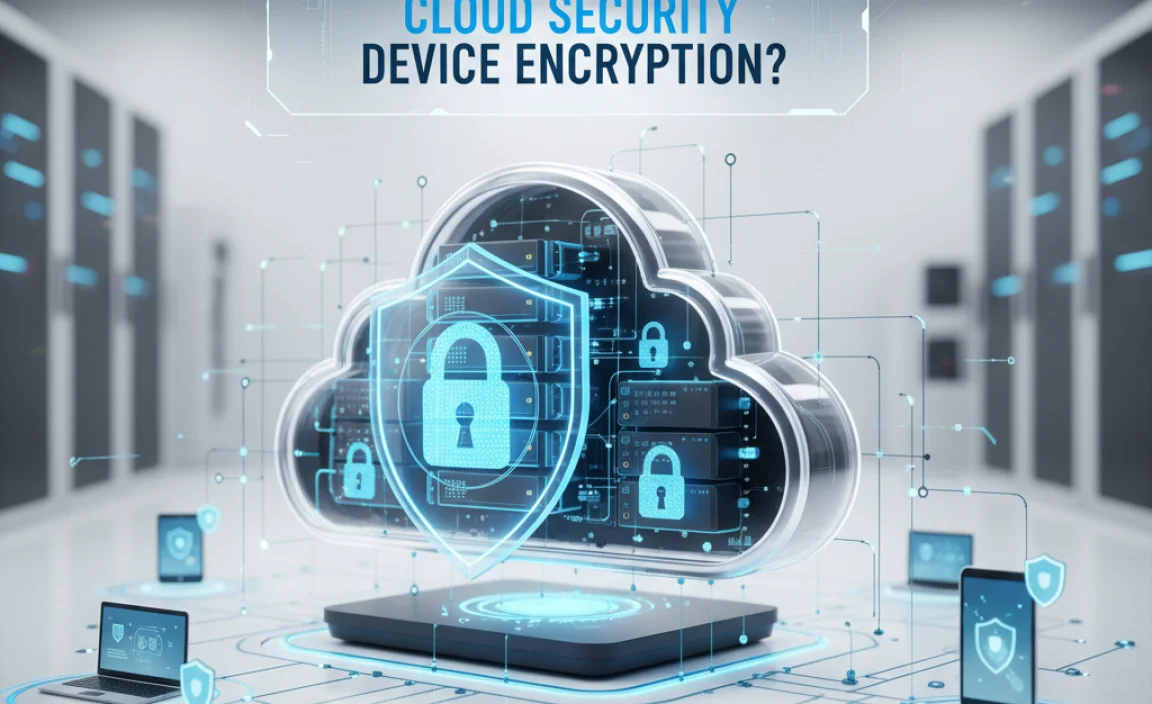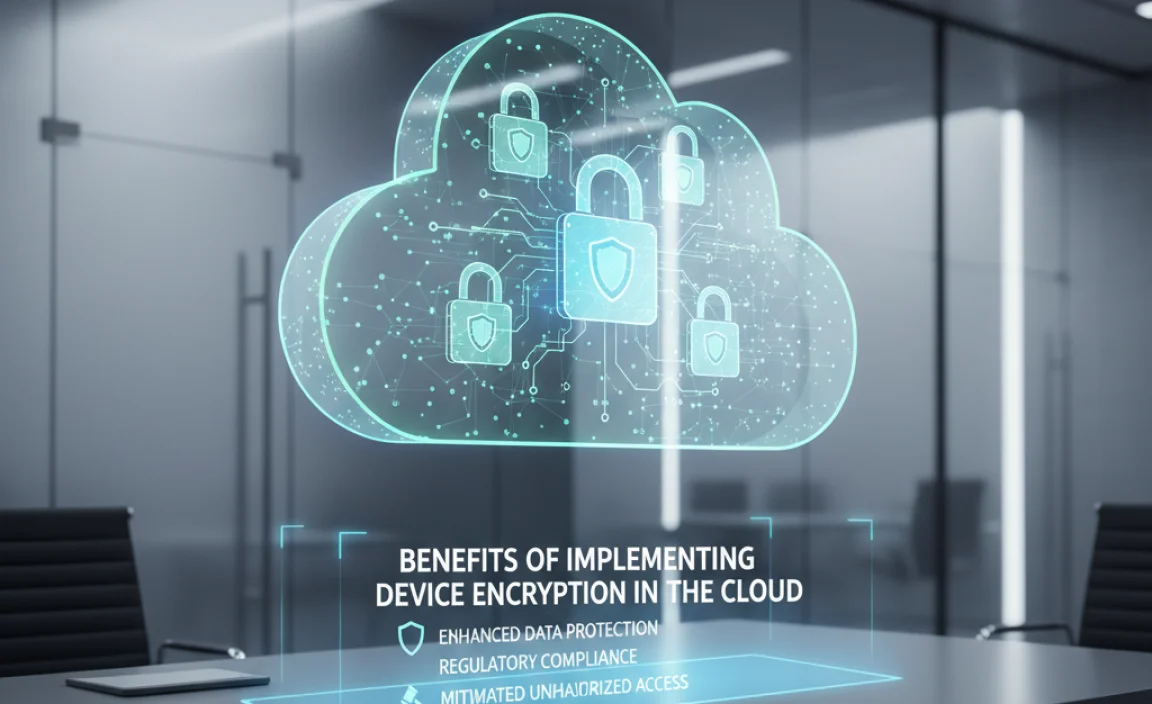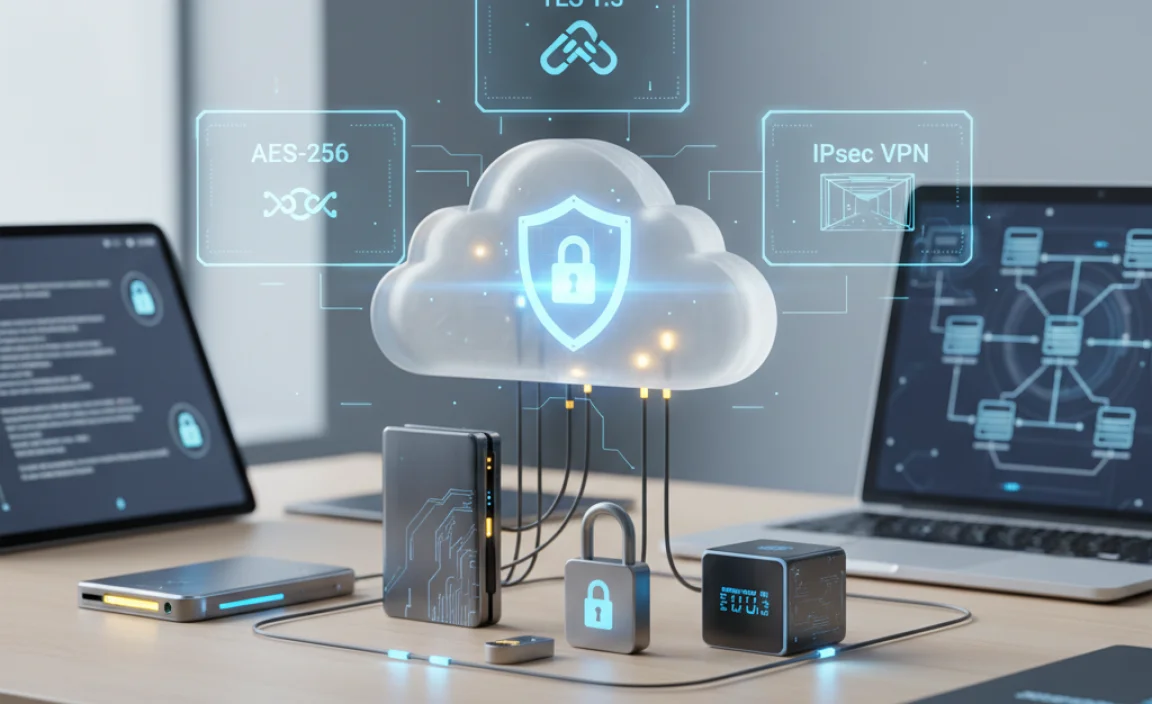Imagine all your favorite pictures and school projects stored online. They sit safely in the cloud, ready for you anytime. But what happens if someone sneaks in and takes a peek? This is where cloud security and device encryption come into play.
Have you ever wondered how your tablet keeps your secrets safe? Device encryption locks your data, making it unreadable to anyone who doesn’t have the key. It’s like a magic box that only you can open.
In a world where we share a lot online, keeping our information secure is super important. What if I told you that cloudy skies can actually protect your data? The cloud provides safe storage, but only if we use the right tools like encryption to watch over it.
Join us as we explore cloud security and discover how device encryption is like a superhero for your data. You’ll learn why it matters and how it keeps your information safe from harm.
The Importance Of Cloud Security Device Encryption Today

Cloud security device encryption keeps your data safe in the cloud. But how does it work? Imagine you have a treasure chest filled with your favorite toys. Encryption locks this chest, ensuring only you can open it. When you store files online, encryption scrambles them, making it hard for hackers to understand. This protection is crucial, especially as more people use cloud services daily. Always look for strong encryption to guard your cherished information!
What is Cloud Security Device Encryption?

Definition of cloud security device encryption. Importance in protecting sensitive data. “`html
The cloud is a great place for storing our stuff, but what keeps it safe? That’s where cloud security device encryption comes in. It’s like a secret agent for your data. It scrambles your information so that only the right people can read it. Imagine you’re sending a diary entry to a friend. You wouldn’t want just anyone to peek, right? This encryption is super important because it protects sensitive data from sneaky hackers.
| Benefits of Encryption | Why It Matters |
|---|---|
| Prevents unauthorized access | Keep prying eyes away |
| Ensures data integrity | No tampering allowed! |
| Boosts trust in cloud services | Who wouldn’t want a secure cloud? |
By using encryption, we give our sensitive information a superhero cape. No villains allowed!
“`
Benefits of Implementing Device Encryption in the Cloud

Enhanced security for data at rest and in transit. Compliance with regulatory standards and best practices.
Using device encryption in the cloud offers great benefits. It enhances security for data both at rest and in transit. This means that even if someone tries to steal your data, they won’t understand it without the right key. Moreover, it helps with compliance to laws and best practices. Many organizations must follow these rules to protect sensitive information.
- Protects data from theft
- Ensures safe data transfer
- Helps meet legal requirements
- Builds trust with customers
Why is device encryption important?
Device encryption is crucial as it safeguards sensitive data and helps businesses follow important laws.
Common Encryption Standards and Protocols

Description of AES, RSA, and other encryption algorithms. Comparison of symmetric vs. asymmetric encryption.
Encryption is like a superhero cape for your data, helping to keep it safe from nosy villains. Two popular methods are AES and RSA. AES, or Advanced Encryption Standard, is fast and uses the same key for both locking and unlocking data. It’s like having a spare key hidden under the doormat. RSA is different; it uses two keys, one public and one private. It’s more like a magic box that only opens for you!
| Type | Example |
|---|---|
| Symmetric | AES |
| Asymmetric | RSA |
Symmetric encryption is speedy but needs the same key on both sides. Asymmetric encryption is safer but can be slower. Think of it as a race between a speedy cheetah and a careful turtle! Choosing the right one depends on your needs, like picking between a race car and a bicycle.
Challenges and Limitations of Cloud Security Device Encryption

Potential issues with key management and access. Impact on system performance and user experience.
Cloud security device encryption brings challenges. One big issue is key management. Losing a key can lock you out of your data. Access problems can arise if the wrong person gets a key. System performance might slow down due to encryption processes. This can frustrate users who want fast access.
- Key management can be tricky.
- Access issues can occur without careful planning.
- Performance can lag, hindering user experience.
How can key management impact cloud security?
Poor key management can lead to data loss or unauthorized access. Keeping track of keys is vital for protecting sensitive information.
What effect does encryption have on system speed?
Encryption may slow down system speed, which can be frustrating for users who want quick access to their files.
Best Practices for Cloud Device Encryption
Recommended strategies for effective encryption. Importance of regular updates and audits.
To keep your cloud devices safe, start with strong encryption. This means turning your data into a secret code. You can use keys that are like super-secret passwords! Also, don’t forget to update your encryption often. Think of it like a superhero’s costume—after a while, it needs a fresh look! Regular checks or audits help spot problems early. They’re like a check-up for your cloud system. Trust us; your data will thank you!
| Best Practices | Details |
|---|---|
| Use Strong Encryption | Turn data into a secret code! |
| Regular Updates | Give your encryption a fresh look. |
| Perform Audits | Check for problems early, like a superhero check-up. |
Case Studies: Successful Implementation of Cloud Device Encryption
Realworld examples of organizations utilizing encryption. Lessons learned from successful encryption strategies.
Many businesses have successfully used encryption to keep their data safe. For example, a hospital protected patient records by encrypting them in the cloud. This move helped them avoid data breaches and stay in line with privacy laws. Another company, a bank, used cloud encryption to secure online transactions, earning trust from their customers. One key takeaway? Never underestimate the power of encryption! It’s like putting your data in a invisible fortress! Here’s a quick look at some organizations’ success:
| Organization | Encryption Strategy | Outcome |
|---|---|---|
| Healthcare Inc. | Encrypted patient records | No data breaches |
| Bank Corp | Secured online transactions | Increased customer trust |
| Retail Co. | Protected payment information | Improved sales |
These examples show how cloud device encryption can make life a lot safer and a tad more fun! Who wouldn’t love a world where their data feels secure, like a superhero in a cape?
Future Trends in Cloud Security Device Encryption
Emerging technologies and their impact on encryption. Predictions for the future landscape of cloud security.
New technologies are changing how we think about security. Innovations like artificial intelligence and blockchain are becoming important. They help to create stronger encryption for data in the cloud. With these tools, businesses can keep information safe from hackers. Experts predict that in the future:
- Encryption will become smarter and faster.
- More businesses will adopt these new technologies.
- Data privacy laws may change to enhance security measures.
This shift could lead to a safer online world. People will trust cloud services even more. Overall, advancements in technology will shape the future of cloud security device encryption.
What are the impacts of emerging technologies on encryption?
Emerging technologies improve encryption by making it stronger and more efficient. This helps protect sensitive data stored in cloud services.
Conclusion
In conclusion, cloud security device encryption is vital for protecting your data online. It keeps your information safe from hackers and helps you maintain privacy. By using encryption, you add an extra layer of defense. To stay secure, consider learning more about encryption methods and tools. Explore resources or ask an expert to deepen your understanding and boost your digital safety.
FAQs
Sure! Here Are Five Questions Related To Cloud Security And Device Encryption:
Cloud security helps keep your data safe when it’s stored online. It’s like locking your treasure in a strong box. Device encryption protects your information on phones or computers. This means even if someone tries to look at your stuff, they can’t read it without a password. Always use strong passwords to keep your stuff extra safe!
Sure! Please give me the question you’d like me to answer, and I’ll help you with it.
What Are The Key Benefits Of Implementing Device Encryption In A Cloud Security Strategy?
Device encryption helps keep your information safe. It changes your data into a code that only authorized people can read. This means if someone steals your device, they can’t see your private stuff. It also helps you follow rules to protect data and keeps your things safe in the cloud. Overall, it gives you peace of mind knowing your info is protected.
How Does End-To-End Encryption Differ From Encryption At Rest And Encryption In Transit In Cloud Environments?
End-to-end encryption keeps your messages safe from all eyes, even the service provider. You send a message, and only the person you send it to can read it. Encryption at rest protects data stored on a server, making it safe from hackers. Encryption in transit secures your data when it’s traveling over the internet. Each type keeps your information safe, but end-to-end encryption is the strongest.
What Are The Common Challenges Organizations Face When Integrating Device Encryption With Cloud Services?
When we use device encryption and cloud services together, we can face some challenges. First, it might be hard to make sure everything works together smoothly. Next, we need to keep track of passwords and keys, which can get confusing. It’s also important to make sure our data is safe from bad people. Finally, if we change or update anything, it could cause problems that take time to fix.
How Can Organizations Ensure Compliance With Industry Regulations Regarding Data Encryption In The Cloud?
To keep data safe in the cloud, we can follow some simple steps. First, we should learn the rules for data protection in our industry. Next, we can use strong passwords and make sure our data is encrypted, which means it’s scrambled so only we can read it. We should also check our systems regularly to fix any problems. Finally, we can train our team to understand the importance of keeping data safe.
What Best Practices Should Be Followed To Manage Encryption Keys And Protect Them In A Cloud Security Framework?
To keep encryption keys safe in the cloud, you should use strong passwords and change them often. Store keys in a safe place, like a special vault meant for keys. Always limit who can see or use the keys—only the people who really need them should have access. Lastly, regularly check on your keys to make sure they are still safe and working right.





